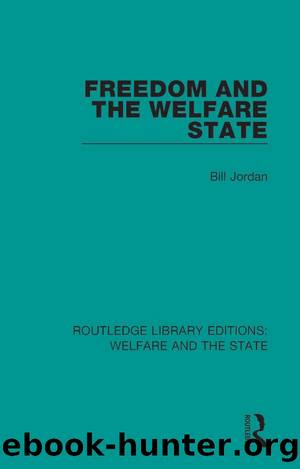Freedom and the Welfare State by Bill Jordan

Author:Bill Jordan [Jordan, Bill]
Language: eng
Format: epub
Tags: Social Science, Sociology, General
ISBN: 9780429889158
Google: 4A9mDwAAQBAJ
Barnesnoble:
Goodreads: 11163167
Publisher: Routledge
Published: 1978-06-01T00:00:00+00:00
10
Two Concepts of Welfare
The interventions discussed in the last chapter took place against a background of an earlier form of state provision. Chadwick himself was as involved with the Poor Law as with the new services he initiated. All the interventions that have developed since the early nineteenth century have presupposed the existence of a system of poor relief which underpinned them. The Poor Law was, and in many ways still is, the fundamental basis upon which all other notions of âwelfareâ provision are founded.
Yet the Poor Law was never a monolithic structure. A number of different, and often conflicting, aims and objectives, themes and counter-themes, principles and practices have characterised its history since the Elizabethan Acts of 1597-1601. The attempt, within the same limited system of provision, to create a framework to deal with the able-bodied unemployed, with unmarried mothers, with widows and orphans, with the sick, the mentally and physically handicapped, the insane, and the elderly, entailed inevitable contradictions. On the one hand, the prevention of idleness and fraud, the maintenance of law and order, and the enforcement of family responsibility; on the other hand, the provision of care, treatment, asylum and a last refuge: these functions were found to conflict and compete, both in the principles behind the legislation on poor relief, and in the practices of those who provided it. To give just one example: in the history of workhouses from the early seventeenth century to the early twentieth can be seen a perpetual struggle between central government and local administrators, the one seeking to establish institutions at once deterrent of idleness and conducive to habits of industry, the other, mainly for reasons of economy, concerned with the long-term provision of residential care for the chronically dependent.
But at an even deeper level than this kind of issue, there has existed a fundamental polarisation about the nature and purposes of poor relief, which has been fought out between two opposing philosophies throughout this history. Two rival concepts of welfare are even today being debated within and between political parties, the major social services and social work agencies. Both polarities were reflected in the system of poor relief that operated between 1601 and 1795; but since then the two have alternated in their supremacy.
Edwin Chadwick based his notion of the modern state and its role in bringing about an artificial harmony between private and public interests on a very strict and pure version of one of these notions of welfare. This was that each and every citizen must live his life in the expectation of providing for every necessity in it, both for himself and for all his dependants (in sickness and in health, in his full vigour and in his old age), out of his earnings from his employment. For the state to provide for any of these needs in such a way as to give rise to the expectation that they might be comfortably met without any care or exertion on his part would be to risk the corruption of the morals of all its citizens.
Download
This site does not store any files on its server. We only index and link to content provided by other sites. Please contact the content providers to delete copyright contents if any and email us, we'll remove relevant links or contents immediately.
Collaborating with Parents for Early School Success : The Achieving-Behaving-Caring Program by Stephanie H. McConaughy; Pam Kay; Julie A. Welkowitz; Kim Hewitt; Martha D. Fitzgerald(898)
Entrepreneurship Education and Training: The Issue of Effectiveness by Colette Henry Frances Hill Claire Leitch(665)
Adding Value to Policy Analysis and Advice by Claudia Scott; Karen Baehler(499)
Materializing the Middle Passage by Jane Webster;(496)
Race and American Political Development by unknow(488)
Sociological Perspectives of Health and Illness by Constantinos N. Phellas(478)
American Government and Politics Today by Steffen W. Schmidt Mack C. Shelley Barbara A. Bardes(475)
Human and Global Security : An Exploration of Terms by Peter Stoett(464)
Control Of Oil - Hardback by Kayal(462)
The Disappearance of Rituals: A Topology of the Present by Byung-Chul Han(399)
Advances in Child Development and Behavior, Volume 37 by Patricia J. Bauer(396)
The Catholic Church and European State Formation, AD 1000-1500 by Jørgen Møller(389)
The World According to China by Elizabeth C. Economy(379)
Theories of Counseling and Psychotherapy: A Case Approach by Nancy L. Murdock(370)
Left Is Not Woke by Susan Neiman(369)
Application of classical statistics, logratio transformation and multifractal approaches to delineate geochemical anomalies in the Zarshuran gold district, NW Iran by unknow(363)
Turkey's Relations with the West and the Turkic Republics: The Rise and Fall of the Turkish Model by Idris Bal(353)
Cross-Cultural Child Development for Social Workers by Lena Robinson(348)
Japan's Ainu Minority in Tokyo by Mark K. Watson(331)
